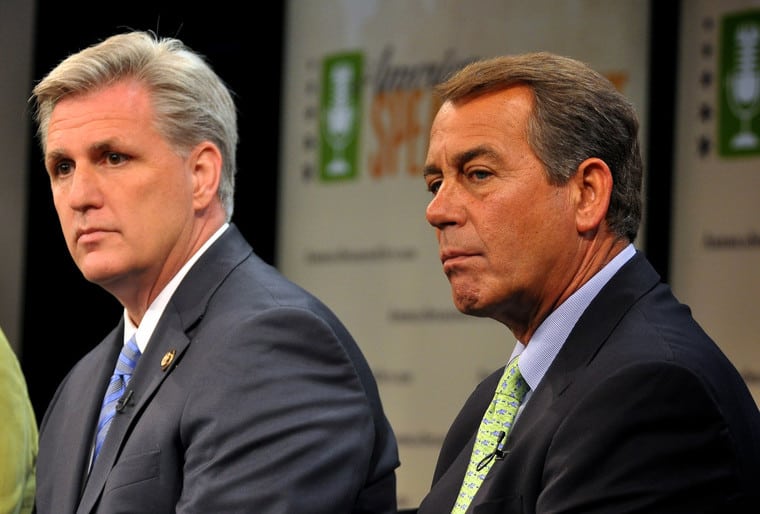
House Majority Leader Kevin McCarthy and Speaker John Boehner – both humbled by right-wing Republican rebels protected by gerrymandering. (CC) House GOP
It’s already clear that the next House speaker will face crippling mutinies by the 45 Republican rebels who knocked off John Boehner and intimidated Majority Leader Kevin McCarthy. And that’s because the insurgents know they can defy their party leadership without fear of retribution from the voters because Republican gerrymandering protects them.
Yes, gerrymandering has been around since the dawn of American politics. But gerrymandering today is a different game – played on a national scale, operating with 21st century digital efficiency, capable of overruling the popular vote. It has baked gridlock into our political system.
Never before in our history has one major party mounted a national campaign to control gerrymandering in state after state, as Republicans did in 2010. And never before have party strategists been armed with sophisticated computer software that can help them carve districts down to the individual street and home.
Thanks to gerrymandering, all but two of the 45 anti-Boehner rebels are guaranteed re-election in politically engineered monopoly districts that insulate them not only from Democratic challengers but also from the dictates of their party leadership, as John Boehner learned in five tormented years as speaker.
Districts Stacked in Favor of Republican Rebels
Their congressional districts are so stacked in their favor that in 2014 they beat their Democratic opponents by an average 38 percentage points, a devastating margin. Only two had competitive general election races. Three had such slam-duck districts that no Democrat even bothered to oppose them.
With protected political monopolies back home, the Republican rebels take little or no political risk and pay no political price for overthrowing a Speaker or for bringing Congress to a halt. What gives them that immunity is partisan gerrymandering and party primaries with shockingly low turnouts, mainly party loyalists and extremist voters.
And so, ironically, the roots of Mr. Boehner’s downfall grew out of a Republican Party strategy in 2009 to follow the advice of Karl Rove, Republican campaign mastermind, who told them pragmatically: “He who controls redistricting can control Congress.”
Following the Rove dictum, the Republican Party poured $30 million, mostly raised from corporations, into what they called “RedMap,” a strategy to dominate the once-a-decade redistricting process in 2011 by capturing majority control of as many state legislatures as possible in the 2010 election.
To see how Republicans pulled off this maneuver continue reading.

